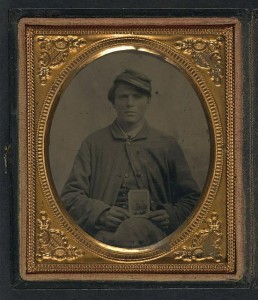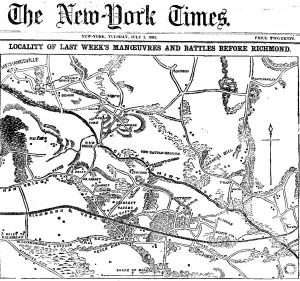
Curran retreated through Bottom’s Bridge (at lower right)
Here’s a long letter home from 150 years ago this week that talks mostly about the Seven Days’ Battles. The 33rd New York Volunteer Infantry Regiment’s main fight was the relatively minor Battle of Garnett’s & Golding’s Farm – the 33rd and other elements of General Davidson’s brigade were on picket duty on June 28th while the bulk of the Union army began its retreat. They fought off a Confederate attack and then joined in the backup.
From A Seneca County, New York newspaper in 1862:
From the Thirty-Third Regiment.
CAMP NEAR CITY POINT, Va.,
July 6th, 1862.
It becomes my painful duty to communicate a brief account of the series of bloody conflicts which we have experienced for the last eight days. No one can comprehend the magnitude and extent of the terrible struggle which our army has passed through since the siege of Richmond commenced. Each day some division or corps of our lines was engaged in the work of death. We were generally victorious, but, alas, at the cost of many of our bravest patriots and soldiers. It became evident to all when the attack commenced that the rebels outnumbered us two-to-one, but we defeated them at every point, notwithstanding we fell back to a new and different base of operations, which is near City Point on the James River. That the retreat was a masterly one and conducted in the best order, no one can deny. The rebels now occupy our former camps and all the grounds between here and Richmond, the White House and Railroad included. In the retreat we had at least five battles, and during each one the rebels were slaughtered on a grand scale. In the first day’s retreat, the 33d Regiment achieved further honors in the cause in which we are all engaged. It was on Saturday, and as the artillery and the greater part of our forces were falling back, the regiment, together with several companies from other Regiments, were sent out on picket, where they kept the enemy in check until all the plans were matured for a change of operations. Our picket line was across a ravine and on the skirts of a wheat field, which divided us from the rebels. Some of our Regiment was on the picket line, some in the ravine, and the balance was down on the flats of the Chickahominy. In the course of the day the enemy opened on our picket and camp with with shot and shell with remarkable accuracy, still I am surprised that the damage was so slight. After a half hour of the most terrific roar of artillery, there was quietness for a moment, when a whole rebel Brigade came across the wheat field, one Regiment after another in line of battle, and attacked our pickets, who poured a volley on their closed ranks with fatal effect. They gradually pressed the pickets on our right until they came around almost in our rear. This move we could not see owing to the thick underbrush and woods in the ravine. Their object was to capture all of us in the ravine consisting in all of four or five companies, but while they were closing around us we anticipated their movements and “skedadled” in a different direction for our rifle pits. We then formed along the whole length of the pit, unnoticed by the rebels, as they supposed they were going to make a big haul in the aforesaid ravine. On they came, however, towards us, and when within a short distance we poured a deadly fire into their ranks. They faced us for half an hour, and we all the time pouring the balls into their ranks, with fearful effect. They came up several times but were as often driven back. At last their lines broke and away they went. After the firing ceased we discovered a white flag behind an earthwork, and upon sending out to meet it, ascertained that it was being borne by nine rebels who came in under its protection. Some of our men went over the field and captured a Lieut. Colonel and some privates, and also a Colonel who was wounded. The rebels had no artillery in the engagement. I went out on the field and counted 27 dead rebels all lying on the ground within a short distance of one another. Some were shot through the head, others through the breast, while others lay mangled in all shapes. I saw one poor fellow with half of his head shot off, and still alive. The ravine was covered with their dead and dying, as was also the wheat field where they first made the attack. They sent in flag of truce and were permitted to bury their dead, which consumed the remainder of the day, and gave our troops a chance to complete our retreat. We kept a picket there during the night. Our loss was about fourteen killed, wounded and missing. MICHAEL BOYLE and WM. GEE in our Company, were taken prisoners. Three in Co. B, were killed; one in Co. A; one in Co. F, and one in Co. D. Lieut. CHURCH, of Geneseo, in Co. E, was also killed. Several others were wounded.
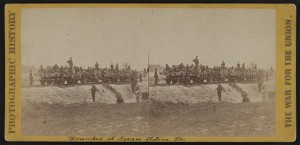
Left behind?
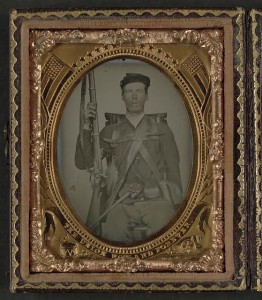
modeling some of James Curran’s impedimenta when he crashed
The next day we marched to Savage’s Station, and in the evening the enemy overtook us and offered battle. We accepted the challenge and cut to pieces all that came up to the work. In this battle the 2d or Vermont Brigade in our Division, was engaged and suffered considerable. During which we fell back to Bottom’s Bridge, or Ceder Creek as it is called, leaving all of our wounded behind in some empty houses in charge of a Physician of the 49th Pa., having no means of bringing them on. I remained at the Hospital until our rear guard came up, and on the way sank upon the ground from sheer exhaustion, where I remained in a profound sleep with knapsack, haversack, canteen, cartridge box and all buckled on, until daylight. When I got up I discovered many in the same fix in which I had been, and therefore had plenty of company to the Bridge.
Before the rebels came up to the Bridge, it was cut away, our division in the meantime remaining until the enemy arrived and opened on us with artillery. Their shot and shell was poured into our ranks with dreadful fury. We fell back to a better position, and formed a line of battle in the edge of the woods a mile in length, while another Division at our left was fighting terribly to keep the enemy from flanking us. In this engagement the Irish Brigade, under the daring MEAGHER, did great execution, driving the rebels before them like sheep. About 10 o’clock P.M., we again resumed our march and at daylight arrived at the James River, where the entire army and its equipments were collected.
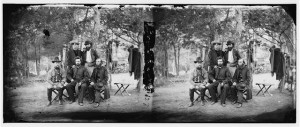
Members of Irish Brigade back at Harrison’s Landing
We were sent out on picket here while the greater portion of the army were engaged in another severe battle, in which the rebels were totally routed and defeated. Our men captured a number of their batteries. The retreat of the army was masterly and complete, and the entire trains and supplies safely landed at our present camp. I think that the retreat of so large an army, right under the eyes of an enemy double its number, and defeating him wherever attacked, is one of the grandest military achievements of the age. We left nothing of any use to the enemy; and though our fighting and marching put the endurance of our brave army to a hard test, still we are in good spirits and ready for the rebels at any time.
Since we arrived here Shields’ Division has joined us, and other reinforcements are expected every day. What the various movements mean I cannot of course say. We have suffered much from exposure and fatigue, our Regiment being always on the move. Our Company has had 7 wounded and 1 killed since we first began the march. Daniel Murphy was killed at Mechanicsville, and James McGraw and John Cullen, wounded in the arm and shoulder. Barney Smith was shot in the arm, Thos. Clancy through the hand, and Frank Alman through the foot. Michael C. Murphy and Jas. Haze were accidently injured by the falling of trees. Otherwise our Company has been comparatively fortunate.
Yours, &c., JAS. CURRAN.

Sergeant Curran of Company K
According to The story of the Thirty-third N.Y.S. vols.; or, two years campaigning in Virginia and Maryland by David W. Judd members of the 33rd were up four straight days, so I can understand why James Curran would have crashed to sleep right where he was walking.
Even the Richmond Daily Dispatch credits the Union army doing a great job evacuating its position near Richmond:”The enemy’s retreat was certainly managed with coolness and generalship. This meed of praise is due him.” However, in an editorial that aims to cheer up Confederate citizens who wanted to capture McClellan’s army the Dispatch points out that driving the Yankees all the way back to Harrison’s Landing was a victory.
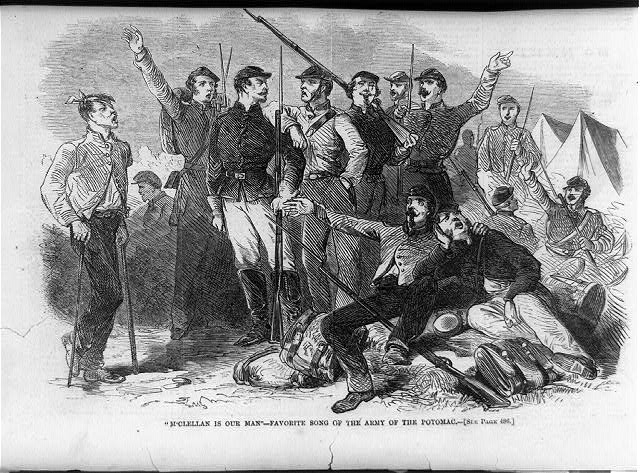
“… though our fighting and marching put the endurance of our brave army to a hard test, still we are in good spirits and ready for the rebels at any time.”

![Plan shewing [sic] entrenched position of Union army at Westover or Harrison's Landing, James River, Va., July and August 1862 by Rober Knox Sneden (gvhs01 vhs00218 http://hdl.loc.gov/loc.ndlpcoop/gvhs01.vhs00218) Plan shewing [sic] entrenched position of Union army at Westover or Harrison's Landing, James River, Va., July and August 1862 by Rober Knox Sneden (gvhs01 vhs00218 http://hdl.loc.gov/loc.ndlpcoop/gvhs01.vhs00218)](https://www.bluegrayreview.com/wp-content/uploads/2012/07/Harrisons-landing-map-300x259.jpg)

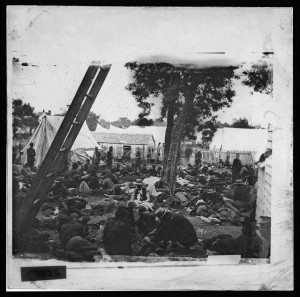






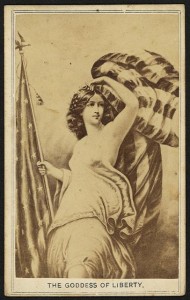
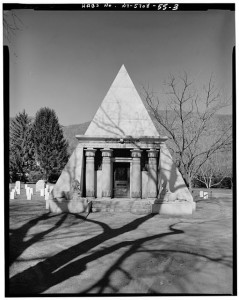
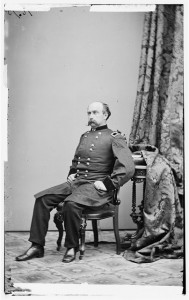
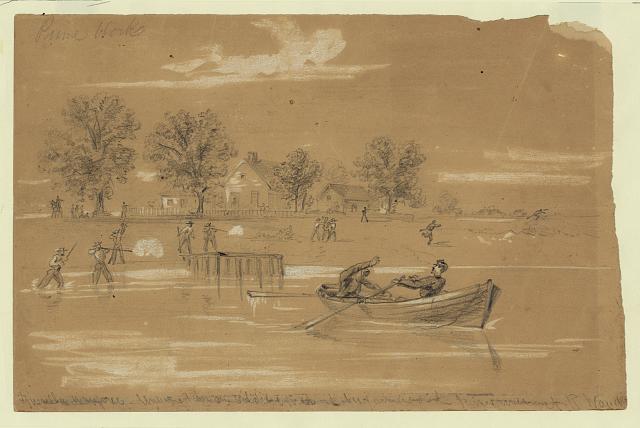
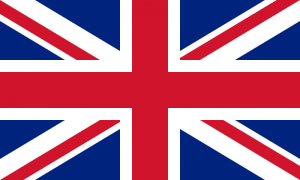
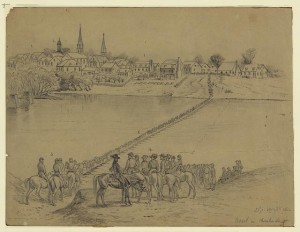
![Fredericksburg Court House now occupied by our troops as a barracks and by the [signal corps] (1862 May 15. by Edwin Forbes; LOC: LC-DIG-ppmsca-20490) Fredericksburg Court House now occupied by our troops as a barracks and by the [signal corps] (1862 May 15. by Edwin Forbes; LOC: LC-DIG-ppmsca-20490)](https://www.bluegrayreview.com/wp-content/uploads/2012/07/20490r-300x194.jpg)
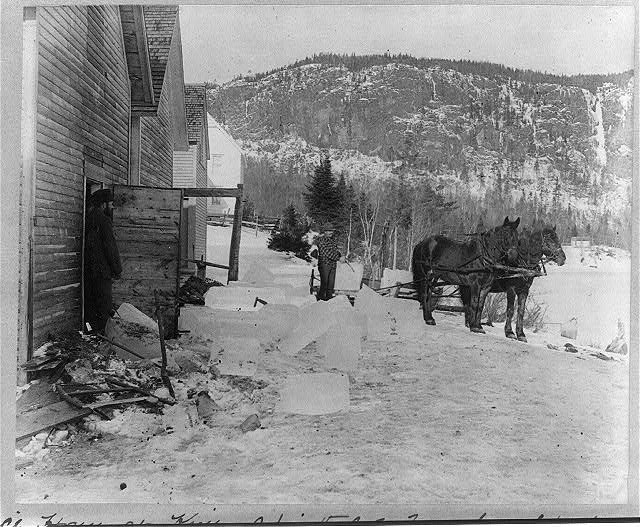
![Map showing the Chicahominy [sic] and James rivers and from Richmond to Harrison's Landing, Va. From the official map made for Genl. Heintzelman by R.K. Sneden, Topgr. (gvhs01 vhs00007 http://hdl.loc.gov/loc.ndlpcoop/gvhs01.vhs00007) Map showing the Chicahominy [sic] and James rivers and from Richmond to Harrison's Landing, Va. From the official map made for Genl. Heintzelman by R.K. Sneden, Topgr. (gvhs01 vhs00007 http://hdl.loc.gov/loc.ndlpcoop/gvhs01.vhs00007)](https://www.bluegrayreview.com/wp-content/uploads/2012/07/Retreat-226x300.jpg)
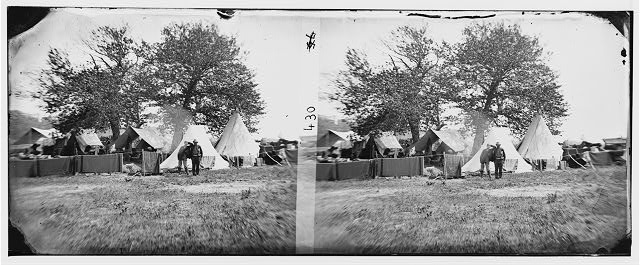

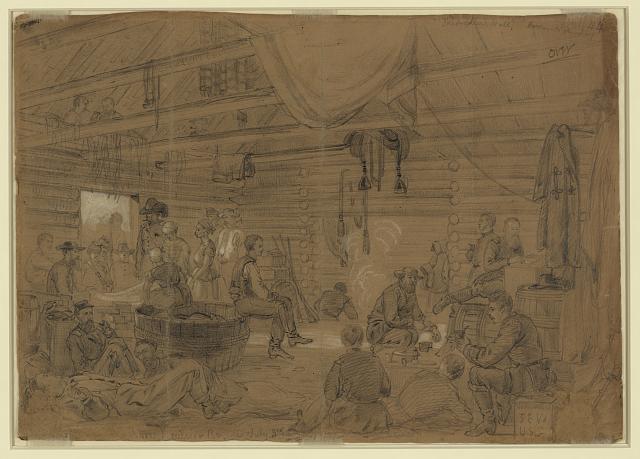
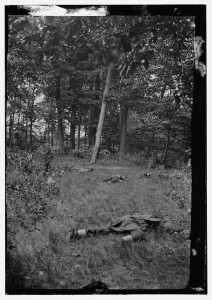
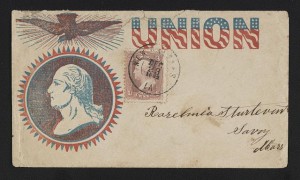
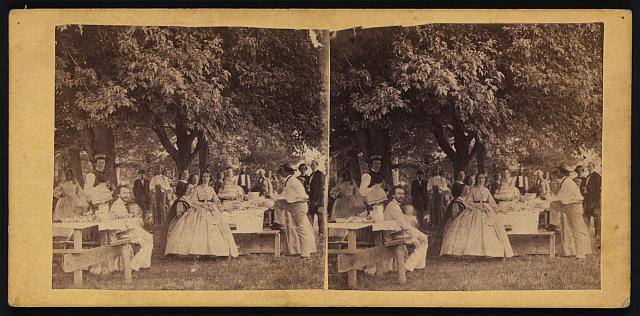
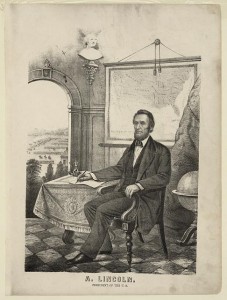
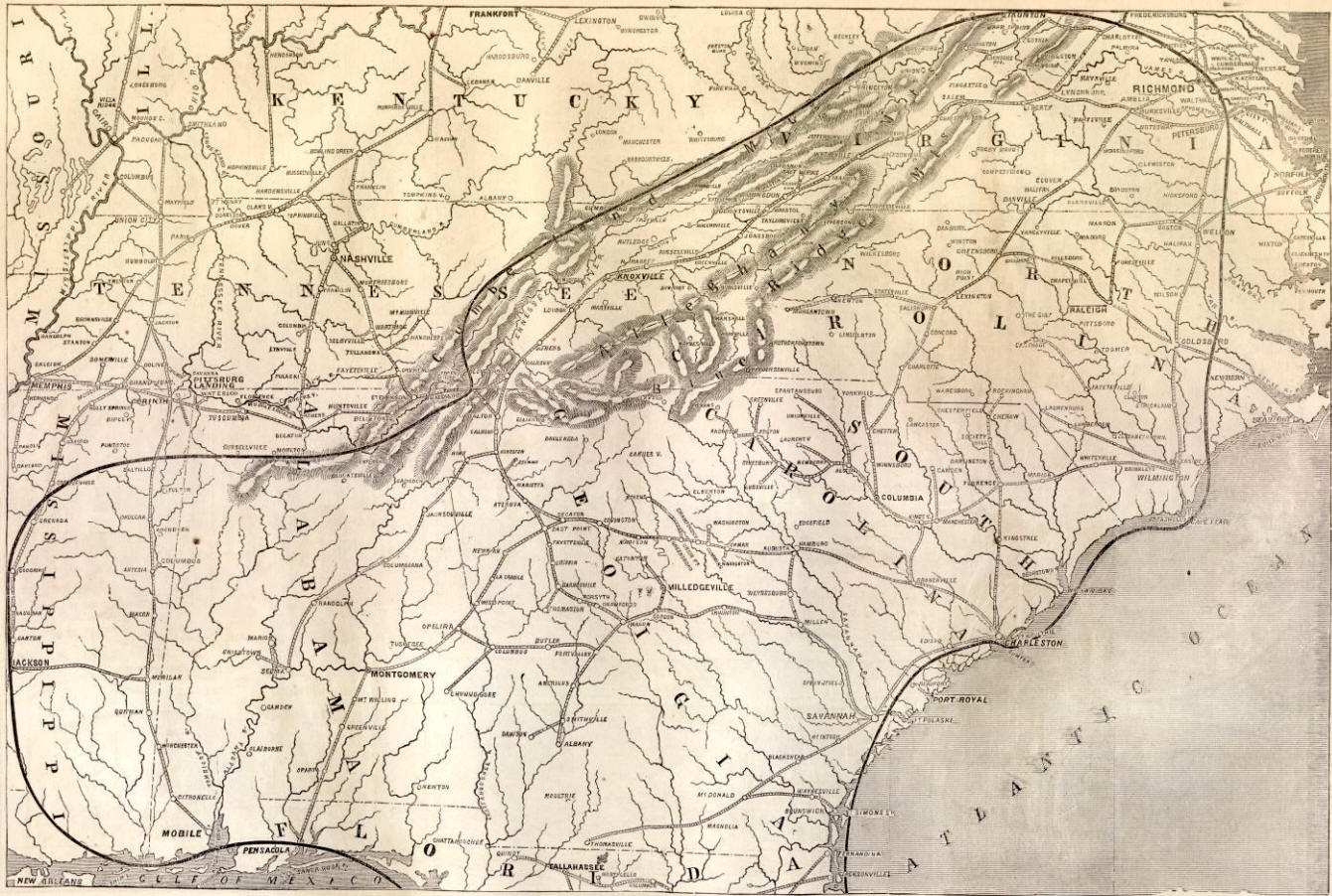
![The manner in which the American colonies declared themselves independant [sic] of the King of England, throughout the different provinces, on July 4, 1776 (1783?; LOC: LC-USZ62-11336) The manner in which the American colonies declared themselves independant [sic] of the King of England, throughout the different provinces, on July 4, 1776 (1783?; LOC: LC-USZ62-11336)](https://www.bluegrayreview.com/wp-content/uploads/2012/07/3a13731r-219x300.jpg)
